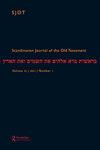“For he had told them”– Mordecai the Jew and Jonah the Hebrew
IF 0.1
3区 哲学
0 RELIGION
引用次数: 1
Abstract
ABSTRACT In Esth 3,2-4 and Jonah 1,6-12 we find fateful confrontations between the main character (Mordecai and Jonah, respectively) and a group of bystanders (the servants of the king; the passengers on the ship). In both instances, information that the hero conveys during his exchange with the bystanders is revealed in retrospect by the narrator, using an expression unique to these two narratives: “for he had told them….” In this article I propose that each narrative contrasts the hero’s self-identity with the manner in which his identity is understood by his interlocutors. The rhetorical technique of retrospection serves the narrator in emphasizing the conflict. The centrality of the question of identity in each exchange, and the use of the same rhetorical device and identical words in each case, lend support to the possibility of reading these as analogous narratives. The article concludes with a discussion of the significance of this analogy.犹太人末底改和希伯来人约拿说:“因为他已经告诉他们了。
摘要在Esth 3,2-4和Jonah 1,6-12中,我们发现主角(分别是末底改和约拿)和一群旁观者(国王的仆人和船上的乘客)之间发生了致命的对抗。在这两种情况下,主人公在与旁观者交流过程中传达的信息都是由叙述者通过这两种叙事所特有的表达方式来揭示的:“因为他告诉了他们……”在这篇文章中,我建议每种叙事都将主人公的自我认同与对话者理解他的身份的方式进行对比。回溯的修辞手法为叙述者强调冲突提供了服务。身份问题在每一次交流中的中心地位,以及在每一种情况下使用相同的修辞手段和相同的词语,支持了将这些作为类似叙事阅读的可能性。文章最后讨论了这种类比的意义。
本文章由计算机程序翻译,如有差异,请以英文原文为准。
求助全文
约1分钟内获得全文
求助全文

 求助内容:
求助内容: 应助结果提醒方式:
应助结果提醒方式:


